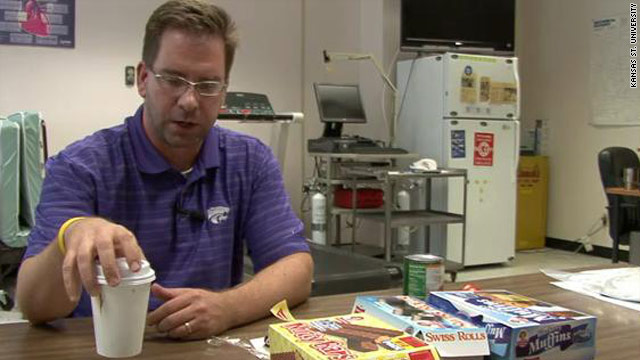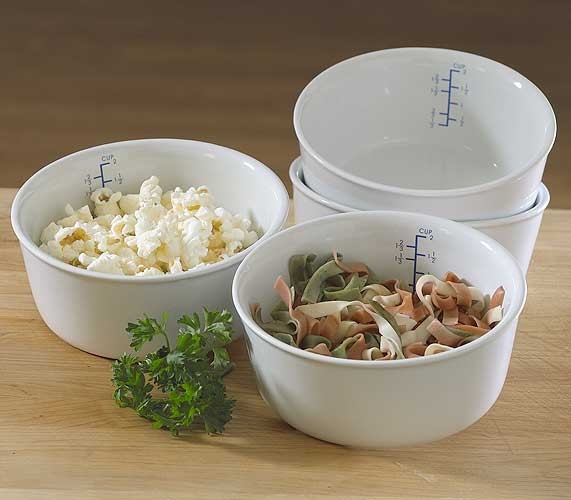Nutrition in the News: The Convenience Store Diet

Unless you live under a rock, you’ve heard about the professor from the Kansas State University who lost 27 pounds on the so called “convenience store diet.” When I first heard this story on the radio yesterday morning, I thought it was a joke. Then when I got to my desk and read my Google alerts [I get nutrition Google alerts, what of it], I realized it was, in fact, a true story.

[Photo courtesy of CNN]
If you haven’t heard of it yet, here are the logistics, according to CNN. Mark Haub, a professor of human nutrition at Kansas State University, ate Little Debbie cakes, Doritos, Oreos and sugary cereals for 10 weeks, every 3 hours, in the place of meals. For this “class project” he had to limit himself to 1800 calories a day. His hypothesis for the experiment was that weight loss is dictated by pure calorie counting and not by the actual nutritional value of what you eat. Going into the experiment, he had his doubts and wasn’t expecting much of a result. However, after 10 weeks of this dietary change, he had lost 27 pounds. Not only this, but his body mass index decreased from 28.8 to 24.9. Also, his LDL [bad cholesterol] was reduced by 20 percent and his HDL [good cholesterol]was increased by 20 percent. This proved that it wasn’t just a fluke; eating sugary donuts, cakes and sodium laden chips made him physically healthier.
Of course, he recognizes that this isn’t the healthiest of lifestyles, however positive the results. The point in the whole exercise was to prove that portion control and calorie consumption were the bottom line to weight loss. Which brings me to the question, “does what you eat not matter as much as how much you eat?”
Naturally, registered dietitians, nutritionists and other nutrition professors weighed in on this as well. Dawn Jackson Blatner, a spokesperson for the American Dietetic Association, reassured that his weight loss success was just a result of caloric reduction and nothing else. As quoted in CNN, Blatner also indicated that when you lose a significant amount of weight, the factors you were facing when you were obese, such as high blood pressure and high cholesterol will also reduce. This, to me, makes some sense. When you lose weight and overall body fat, you are lessening the risk of diabetes, high blood pressure, cardiac disease and heart attacks, which will in turn lower your blood pressure, cholesterol and other risks for these complications. However, I’m still not sold on the fact that what you eat doesn’t matter as how much.
This doesn’t even look healthy, does it? [via]
For example, take the Atkins Diet, which is a low-carb, high protein diet geared towards helping people eat less carbs and more protein. When it first came out, people thought it was revolutionary; a fantastic answer to their weight problems. However, as the years have passed, more studies have proven the negative impacts a high-protein, low-carb diet can have on your body, including high blood pressure risks. According to the American Heart Association, diets like Atkins restrict healthful foods that provide essential nutrients to our bodies. Limiting carbs may raise blood pressure via associated reductions in potassium, calcium and magnesium. Couple this with an increase in sodium and your body becomes more susceptible to gout and osteoporosis. Although people have lost significant amounts of weight on this, they’ve also increased their risks for high blood pressure, cardiac arrest, gout and osteoporosis! This only reinforces my belief that what we are eating is still important.

Portions matter, obviously, but are they all that matters in the weight loss arena? [via]
This question of what we eat versus how much was also addressed by Blatner in the article by CNN. She stated that what can’t be measured, such as a higher risk of cancer, diabetes and other health complications, needs to be taken into account when a person stops eating vegetables, fruits, lean proteins and whole grains. These are the things that can’t be measured as quickly as weight loss, but in the long run, determine our overall health. Even though this snack food diet caused Professor Haub to lose weight, lower his bad cholesterol and reduce his body fat, it still begs the question of what the negative impacts will be in the long run, if he keeps it up. And according to Haub, who is adding an additional 300 calories of healthy foods to his diet, the snack cakes aren’t going anywhere for a while.
In the end, I’m not shocked by the results. When you reduce your calories by over 1,000, you are going to see dramatic results. There is no disproving that. However, when you replace healthy foods with processed, high sugar, high fat snacks, the long run results could not be as positive. The data proved his hypothesis, but I’m still not buying it. And even though I’m looking to shed some weight for my wedding, you won’t see me stocking up on Little Debbie snacks at the local grocer anytime soon. How I feel has a direct correlation with what I eat, and eating crap will result in me feeling like crap. No matter what the claims are, I’d much rather be a little heavier but actually feel good, physically and mentally.
I’m eager to know everyone else’s opinions on this! Please feel free to chime in, even if you aren’t a nutrition junkie like myself!

 PIN IT!
PIN IT!









The question is, if this guy ate the exact same # of calories but healthier foods, would he lose weight and/or feel more fulfilled? THAT I am interested in finding out.
Also- I hadn't heard of this!!!!